12. Following (1998)
Baby steps of course, but Nolan’s cheap-as-chips feature debut showed undeniable promise. Shot on weekends on black-and-white stock, with Nolan operating the camera himself, it’s an interestingly loopy yarn with hairpin narrative bends; a bit studenty, perhaps, but the kind of thing Nolan would refine in his later, more polished outings.
11. Insomnia (2002)
One of Nolan’s first Hollywood films is this story about a tired detective in Alaska. He had the opportunity to work with big names like Al Pacino and Robin Williams, who took on a very different type of character than usual. This movie is a remake of a cult thriller from Norway, and while it may not be as unique as Nolan’s other works, he still managed to handle the complex and morally ambiguous storyline well and create some impressive scenes.
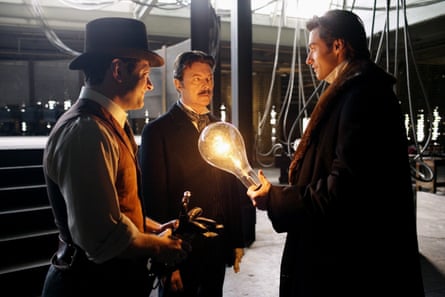
10. The Prestige (2006)
In the midst of his initial two Batman movies, this was always seen as an unusual addition in the Nolanverse. The passing of time has not significantly changed this perception. The story revolves around two 19th-century performers, portrayed by Hugh Jackman and Christian Bale, who engage in a rivalry over a complex teleportation illusion (which ultimately involves the legendary inventor Nikola Tesla, portrayed by David Bowie, and the magic of early electricity). The Prestige has a noticeable steampunk atmosphere. Despite Nolan’s usual dedication to his work, in hindsight, it is not within his comfort zone.
9. Tenet (2020)
Nolan gained a lot of favor by releasing Tenet during the peak of the Covid pandemic, when the closure of movie theaters posed a threat to the entire Hollywood industry. However, out of his three grand and large-scale science fiction masterpieces, this one may be the least fulfilling. It is a complex story about time travel and a future terror attack, with a secret organization trying to stop it. As always, Nolan puts his full effort into the intricate concept, but the narrative pacing feels forced. Despite being a skilled dramatic actor, John David Washington comes across as somewhat emotionless in the lead role.
8. The Dark Knight Rises (2012)
Nolan revitalized the Batman series, much to the relief of DC and Warner Bros. After the unsatisfactory response to Joel Schumacher’s lighthearted approach in the 1990s, Nolan finished his trilogy with a strong ending. Though there was some criticism of Tom Hardy’s muddled speech as supervillain Bane, overall it was a satisfying conclusion. By breaking Batman out of his self-imposed isolation, it set the franchise on a positive path.
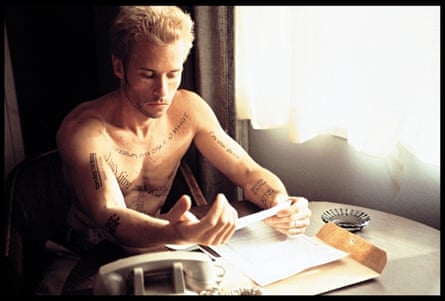
7. Memento (2000)
Memento, directed by Nolan, marked his official debut and was a brilliantly crafted film noir. It breathed new life into the clichéd narrative of memory loss, a common trope in thrillers since the 1940s. Nolan displayed his adeptness at handling a top-notch cast, including Guy Pearce (resembling a mix of Brad Pitt and Don Johnson fresh off his success in LA Confidential) as the vengeful protagonist with anterograde amnesia. The film cleverly uses a mixture of color and black-and-white visuals to distinguish between different timelines (a technique he would later revisit), although ostensibly exploring themes of identity and self, the focus remains on the enthralling storytelling.
6. Batman Begins (2005)
It may have been difficult for young people to understand the nervousness felt by Warner Bros when attempting to revive Batman after its failure in the 90s; the stakes were high. Director Christopher Nolan’s approach was a complete contrast to Joel Schumacher’s attempt in Batman & Robin. He presented a serious and intense Bruce Wayne, portrayed by the brooding Christian Bale, who embarks on a journey around the world to discover his true self before returning to his hometown of Gotham, reuniting with the Batsuit and Batmobile. This version of Batman was somber and introspective, satisfying the expectations of fans. The risk paid off tremendously.
5. Interstellar (2014)
This space travel story, inspired by the galaxy, bears similarities to Nolan’s spiritual guide, Stanley Kubrick. His admiration for 2001: A Space Odyssey is evident as he even orchestrated a “unrestored” re-release years later. Interstellar follows a similar path, using advanced visual effects to explore raw human feelings. While not quite reaching the grand scale of Kubrick’s work, Nolan’s film impresses with vivid depictions of otherworldly landscapes and cosmic skies.
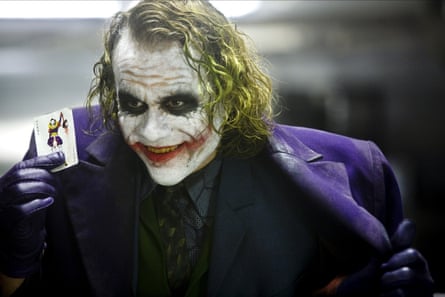
4. The Dark Knight (2008)
Nolan’s films are known for their grand cinematic design, which can sometimes overshadow and even intimidate the human characters involved. However, this was not the case in the second installment of his Batman series. Previous actors, from César Romero to Jack Nicholson to Joaquin Phoenix, have all given outstanding performances as the Joker, but it was Heath Ledger who truly stood out with his portrayal of the character. His paint-smeared, watch-the-world-burn acting was exceptional and ultimately earned him a posthumous Academy Award for Best Supporting Actor. Coincidentally, Nolan’s direction also helped elevate the superhero genre to be more like a traditional big-budget thriller, appealing to wider audiences beyond just comic book fans.
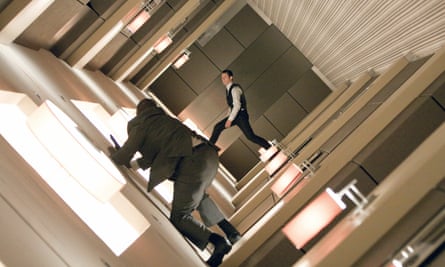
3. Inception (2010)
Sometimes, no matter how crazy a movie may seem, you simply have to acknowledge that it has left a lasting impression. Inception’s iconic shot of the Paris street folding over the horizon, reminiscent of Ozymandias, will be ingrained in humanity’s genetic memory even after everything else has faded away into dust. Leonardo DiCaprio, playing an unreliable narrator in his “Shutter Island” phase, takes on the role of an investigator and manipulator in Nolan’s mesmerizing dreamscape. The film is a wild and awe-inspiring spectacle as Nolan employs every special effect imaginable to create a convincing blend of psychological science that captivates and engulfs the audience. Needless to say, it is incredibly effective.
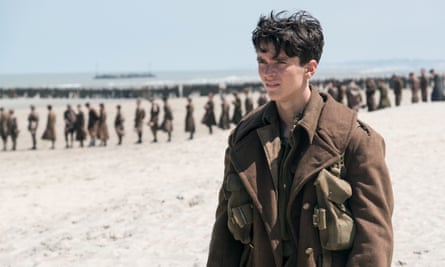
Expand the image to full screen view.
2. Dunkirk (2017)
Nolan’s first attempt at a more realistic historical film introduced new elements to his artistic style: carefully selected and almost experimental shots, a narrative that does not revolve around any specific protagonists, and an understanding of the larger social forces at play during major historical events. The film’s release following the Brexit referendum made it particularly appealing to the anti-EU faction. However, the film is expertly crafted by a talented filmmaker and presents a humane interpretation of war, focusing on the experiences of ordinary soldiers rather than glorifying it. There are, of course, brilliantly orchestrated combat scenes, including thunderous artillery fire and grim deaths, but the film ultimately portrays the true horrors of war and how people responded to them.
1. Oppenheimer (2023)
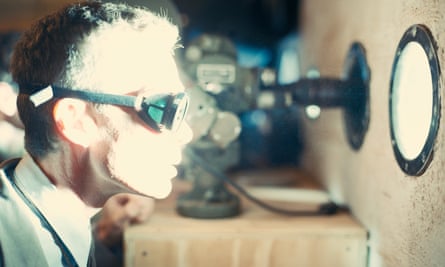
Display the image in full-screen mode.
Nolan’s second take on the Second World War delves into a relatable subject: the fear of an impending nuclear holocaust. Surprisingly, despite its focus on atomic bombs, the film has minimal explosions – though the one major blast is impactful. Rather, Nolan has constructed a flawlessly crafted dialogue-driven narrative, weaving together timelines that delve into J Robert Oppenheimer’s scientific career, his political and personal loyalties (and betrayals), his influence in the corridors of power, and his battle to defend himself against a political ambush. With fewer grandiose action scenes, Nolan allows space for two exceptional performances. Cillian Murphy delivers a standout portrayal as Oppenheimer, showcasing a glittering gaze and distant stare. However, he is outshone by Robert Downey Jr.’s masterful interpretation of Lewis Strauss, Oppenheimer’s once-ally-turned-enemy. It’s almost jarring, especially in the current political climate, to witness the seriousness with which the American political system is portrayed in the film – and bringing attention to the abuse of such institutions may prove to be Oppenheimer’s most lasting achievement.
Source: theguardian.com


